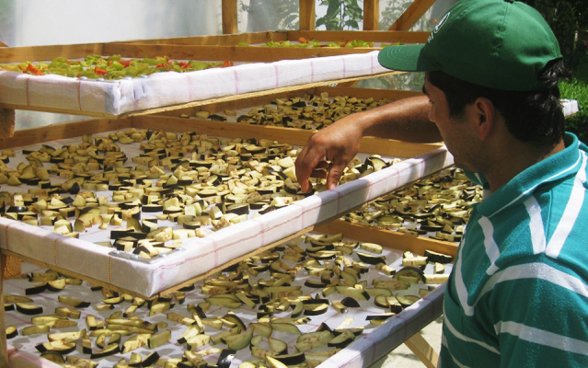- Share this article
- Subscribe to our newsletter
Improving diets in mountain regions thanks to local innovation
As our Swiss ancestors knew all too well, life in mountain regions is challenging. Without infrastructure, people had to fend for themselves to find food and feed their families, leaving them susceptible to famine.
This situation is still a reality in many parts of the world. Almost half of people living in rural mountain communities in low-income countries are exposed to hunger, poverty and malnutrition. In the mountains in particular, cultivation periods for farmers are short, while the distances to market are long. This makes it difficult to produce enough food for subsistence on the one hand, and to generate income from selling the products on the other.
To counter this situation, the Swiss Development Cooperation (SDC) and its partners developed the Nutrition in Mountain Agro-Ecosystems (NMA) project, which operates in eight countries (Ecuador, Ethiopia, India, Kyrgyzstan, Nepal, Pakistan, Peru and Tajikistan). The project aims to promote sustainable cultivation and production of diverse foodstuffs, such as fruit, vegetables, beans, milk and eggs, to enable healthy diets.
Every single person can make a difference
Preventing malnutrition is important, especially in children, since an insufficient supply of vitamins and minerals in early childhood affects children’s physical and mental development and the effects can be passed from one generation to the next.
But besides ensuring access to a varied diet, it is just as important that people are aware of the benefits of healthy and balanced eating. Cultural habits can play a major role here. The NMA project therefore includes a dialogue component to raise awareness through direct exchange and to identify solutions in collaboration with families.
This is why the project works hand in hand with rural service providers. These are local residents who reach out to the populations and advise them about eating a balanced diet. They identify and implement solutions that are relevant to the local context and address structural problems, such as significant seasonal variations in the price and availability of fruit and vegetables.
Many solutions have the potential to be replicated and used in other places. To this end, the rural service providers regularly exchange views and ideas in five languages on a digital platform. The digital networking of these rural service providers on a global scale facilitates valuable social contact and important exchange of experience. Overall, this results in social capital, which can help effect significant change at regional level.
A positive impact on women’s diets
Using this successful approach, the NMA project initiated by the SDC has improved dietary habits in five countries with more than 130 other solutions in an initial phase. In Ethiopia, Pakistan and Peru, there is evidence that women now eat at least five out of ten food groups on a regular basis, which indicates a balanced diet. In particular, they eat more fruit, vegetables and fish, and they are more involved in purchasing decisions. The focus on women is deliberate, as women are the ones who cut down the most when food is scarce, and a balanced diet during pregnancy is essential to the health of the child.
From local to global change
Can these micro interventions really have a global impact? Barbara Zilly, NMA project manager at IFOAM – Organics International, thinks they have a great deal of potential: “The NMA project is most effective when we successfully combine these practical local solutions with discussions at national and international level.” The results of the project are now being used to motivate governments and international organisations to incorporate nutrition-sensitive approaches in laws and interventions.
The SDC is now supporting the second phase of this project, and is contributing its expertise to help achieve global food security and deliver on the 2030 Agenda.
(SDC/wi)
More information:
The SDC’s commitment to agriculture and food security
https://www.eda.admin.ch/deza/en/home/themes-sdc/agriculture-food-security.html





Add a comment
Be the First to Comment